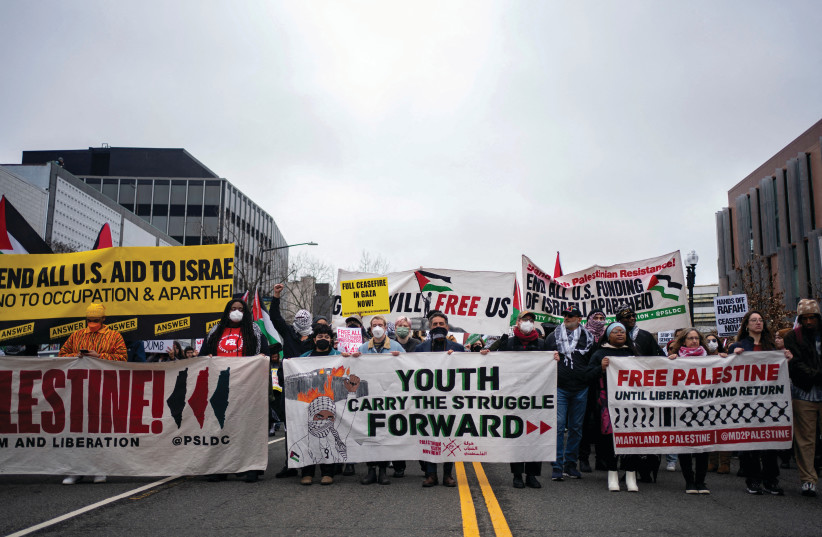Our family recently spent two weeks in the US. So you’re probably wondering whether we experienced any of the post-Oct. 7 surge in antisemitism that’s been extensively reported in the news, including in my own columns.
We were in fact accosted in Brooklyn, but it wasn’t from the pro-Hamas crowd. Rather, it was three young Chabad men dressed up as clowns who decided I needed to put on tefillin right then and there as I was walking purposefully toward an Apple Store.
I tried to stay focused on my goal – an appointment to try out the new Apple Vision Pro augmented reality goggles – but the Chabadniks followed me for blocks, their calls increasing in intensity.
“Come on,” the ringleader cajoled. “It’s Purim, after all. When was the last time you laid [put on] tefillin?”
I didn’t want to be rude, but I also didn’t want to be late as I tried to put some social distance between us.

I should have been happy it was fellow Jews doing the cajoling; I wasn’t looking forward to spending time on a long-delayed vacation (originally scheduled for October 10, canceled for obvious reasons) fighting off a bunch of antisemitic, Israel as colonial-apartheid state protesters at every turn.
Indeed, we had plenty of reason to worry that might be the case.
Our son, Aviv, is roommates with Jonathan Telsin, whose stories I’ve shared previously about the horrific events that Israeli and Jewish students studying at The New School in Manhattan have been experiencing since the start of the war in Gaza.
Aviv hasn’t been spared, either.
JUST A week before we arrived [in New York], a group of pro-Hamas students essentially broke into The New School, attempting to shut down a talk by an IDF soldier who had been invited to relate what he had seen fighting in the Gaza Strip. The protesters proceeded to bang on the walls of the classroom where the lecture was taking place, screaming racist epithets while campus security stood by and did nothing.
When the Jewish students, including Aviv and Jonathan, eventually left the classroom, the antisemites were waiting for them in the hallway. In a scene that could have been lifted straight out of a script for Game of Thrones, the Jews were forced to pass a gauntlet of masked protesters yelling such slurs as “How does it feel to be complicit in genocide?” and “How many did you murder today?”
As Aviv left the building, a protester followed him for a good five minutes, videotaping him while repeatedly taunting him as a “baby killer.”
Would Aviv be “doxed” with his name shared across antisemitic networks?
So, when Aviv began publicizing his senior recital, which featured mostly Israeli jazz musicians with noticeably Hebrew names, I was concerned the protesters could have identified him and were now planning a new rally outside the concert hall.
They didn’t, and the concert proceeded smoothly. Indeed, other than posters we saw on seemingly every corner bodega in Brooklyn calling to “Free Palestine,” we didn’t run into any haters ourselves.
Were we just lucky or has the rising antisemitism that’s stayed at the top of the Jewish headlines for the past six months been overstated?
Has rising antisemitism been exaggerated?
The latter seems a stretch.
Just last week, for example, a study conducted by the Online Hate Prevention Institute found that incidents of antisemitism between October 21, 2023, two weeks after the Hamas massacre, and February 8, 2024, increased more than fivefold to 145 a day, compared with 27 a day in the same period the previous a year.
Franklin Foer’s viral essay in The Atlantic, “The Golden Age of American Jews Is Ending,” further raised the alarm.
WE ACTUALLY thought we were in for a confrontation the week before when we were in California. A group of protesters stood outside the entrance to the Los Angeles Zoo with placards reading “Free…”
I braced myself for the now familiar second part of the exclamation, but it read “Billy,” and the protesters’ ire was focused on the zookeepers who, they claimed, were refusing to repatriate an Asian elephant named Billy.
Indeed, California seemed as bucolic as ever, at least in the places where we visited family: La Jolla, Los Angeles, and Santa Rosa, the latter where my 92-year-old mother lives.
While family was curious about life in Israel, about politics, war, and the fate of the hostages, they mostly refrained from peppering us with questions; our time was focused on introducing two-year-old Ilai and three-month-old Roni to their great-grandparents in California.
Aviv’s concert was fantastic (I know, I’m biased). He chose five original tunes and two covers. The closing number was an arrangement of Guy Mazig’s “If You Would Only Talk.” Noa Havakook, a young Israeli singer also studying in the jazz program at The New School, joined Aviv’s ensemble on stage and began crooning – in Hebrew.
“It was important to me to include an Israeli song to symbolize my identity during this time,” Aviv told me afterward.
It was one of the few times I’d heard Hebrew on the trip. And I hadn’t heard any Israeli music since we flew out of Ben-Gurion Airport. I was deeply moved, both from the beautiful melody, which was more pop than bop, and Noa’s soaring vocals, which reminded me why we live in Israel and how connected to this place I feel.
Afterward, my wife, Jody, commented that it was brave for Aviv to include a song in Hebrew, given the current environment. What a sad statement – that owning one’s Israeli identity abroad, rather than hiding outward Jewish symbols and language, has been transformed into an act of defiance rather than what it should be – a simple expression of pride.
The writer’s book Totaled: The Billion-Dollar Crash of the Startup that Took on Big Auto, Big Oil and the World is available on Amazon and other online booksellers. brianblum.com
